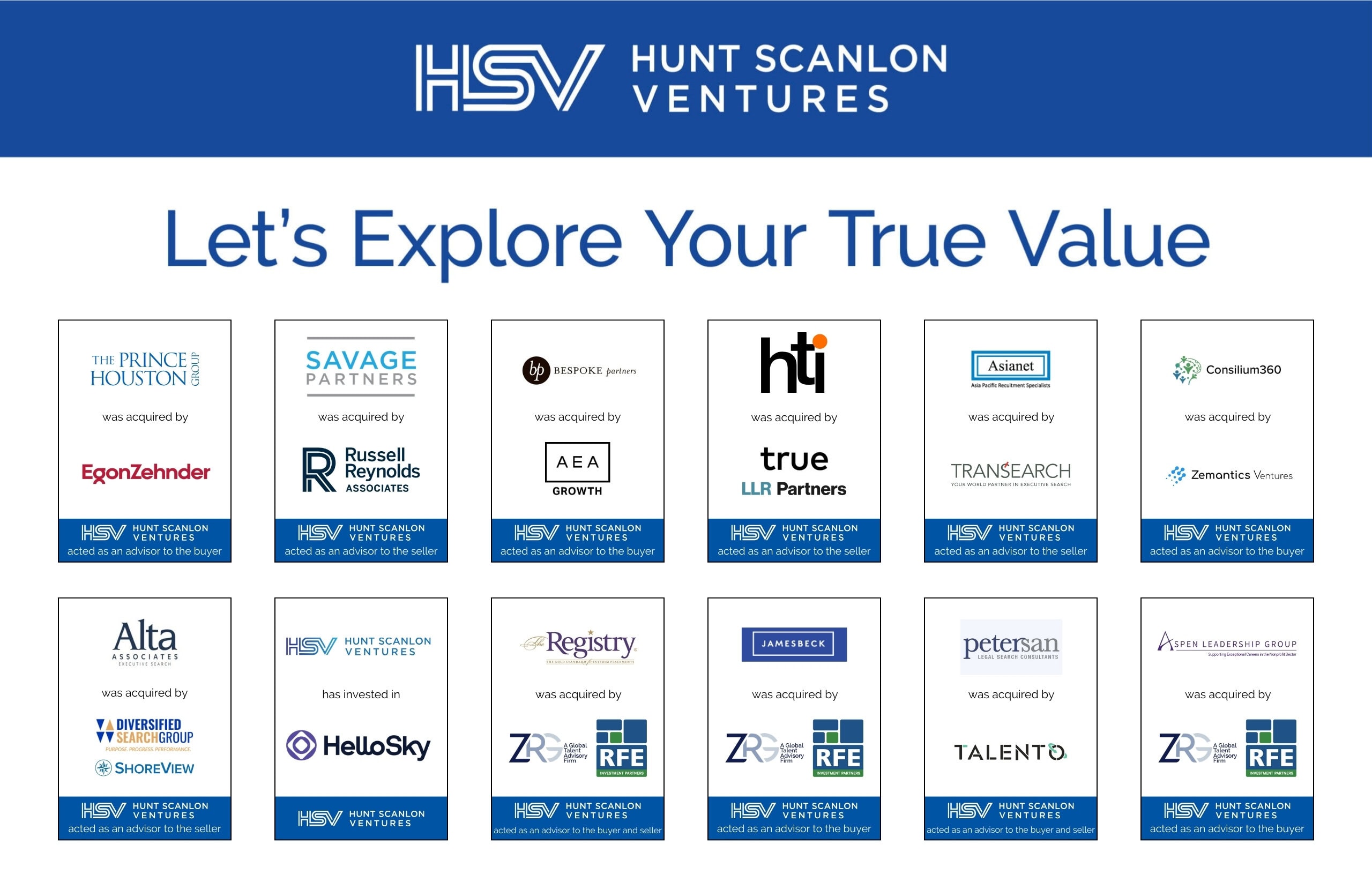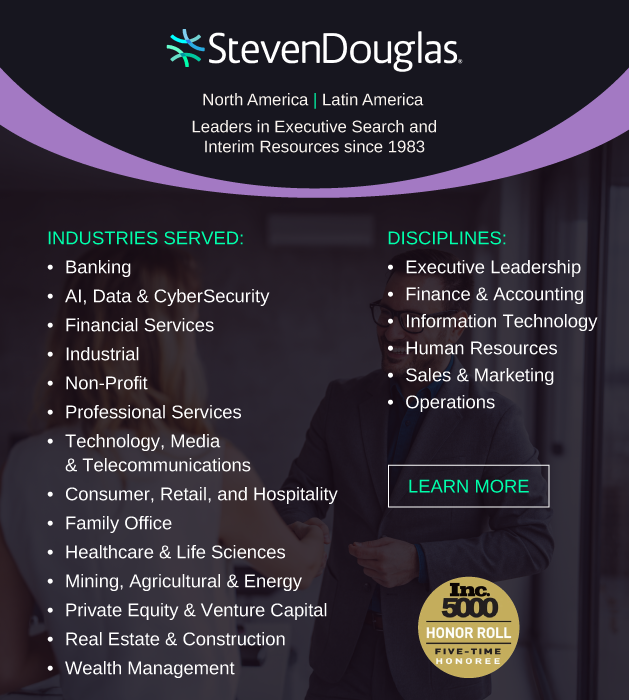The human capital sector is experiencing its most active period of M&A in recent memory. Search firms, interim platforms, and leadership advisory providers are all navigating rising buyer interest, AI-driven transformation, and mounting pressure to scale. Drew Seaman, managing director at Hunt Scanlon Ventures, unpacks what’s fueling the surge – and why consolidation is accelerating across every corner of the market.
The human capital sector is entering a defining moment. Long known for its fragmentation and founder-driven models, the sector is now moving rapidly toward consolidation, scale, and tech-enabled reinvention.
According to Hunt Scanlon’s newly released 2025 Mid-Year Executive Search M&A Report, 58 percent of search firms polled are actively considering a transaction – an all-time high. For investors and founders alike, the message is clear: the deal window is open.
“Buyers are actively seeking specialized and scalable platforms that bring sector-specific depth, embedded client relationships, and strong brand recognition,” said Drew Seaman, managing director at Hunt Scanlon Ventures. “They want growth.
Two Landmark Deals Signal Intent
Egon Zehnder’s acquisition of The Prince Houston Group earlier this month, in which Hunt Scanlon served as the buy-side M&A adviser, underscores how top global platforms are now making strategic bets on targeted U.S. growth – oftentimes setting their sights on boutique operators who can bring them immediate lift into an industry- or functional-specific growth niche.
“In this case, Prince Houston brought an extraordinarily deep 25-year client book in asset and wealth management,” said Mr. Seaman. “Uniting both firms reflects our belief at Hunt Scanlon that leadership advisory is a value multiplier.”
Russell Reynolds Associates achieved this 20 months ago when it acquired Savage Partners, giving the world’s second largest executive search and leadership advisory firm swift access to the PE-backed software sector. In this case, Hunt Scanlon Ventures served as the sell-side M&A adviser.
“In both instances, boutique firms brought unparalleled industry expertise – and connections – to large, global rivals,” said Mr. Seaman. “In return, these broad-based billion dollar advisory platforms brought international reach and expanded GTM teams and infrastructure,” he said.
“Executive search firms are increasingly seen as foundational partners in leveraging leadership as a primary value driver for organizations. As their credibility rises, so too does their investment value.”
“These combinations, when fit together correctly, add tremendous go-forward value and Hunt Scanlon excels at delivering these types of finely crafted mergers,” he said.
Leadership Drives Enterprise Value
“Executive search is at a strategic inflection point,” said Mr. Seaman. “Leadership has emerged as the primary driver of enterprise value, and firms that recruit or advise on it are increasingly seen as fundamental to corporate growth and transformation.”
“Executive search firms are increasingly seen as foundational partners in leveraging leadership as a primary value driver for organizations,” said Mr. Seaman. “As their credibility rises, so too does their investment value,” he said.
M&A Conversations Grow More Serious
According to Hunt Scanlon data, the first half of 2025 tells a tale of two quarters. Forty-two percent of firms reported revenue growth in Q1, but momentum slowed in Q2 as hiring decision-making lagged and budget caution crept in.
Still, 67 percent of search firms surveyed remain optimistic about the second half of the year.
Financial services, private equity, and healthcare continue to outperform. Education, nonprofit, and public-sector mandates, by contrast, are facing longer timelines and tighter budgets.
This divergence, noted Hunt Scanlon, is prompting recruiters to double down on strong verticals while diversifying exposure and broadening their base to mitigate risk.
Search firms were also seen managing their own internal pipelines more conservatively in the first half of 2025. Hiring is targeted, and talent deployment is strategic. Leadership teams are balancing near-term visibility with longer-term opportunity, particularly as M&A conversations grow more serious.
AI, Interim, and the Rise of Platform Thinking
One of the biggest shifts underway, said Hunt Scanlon, is that AI is no longer viewed as experimental. Seventy percent of search firms reported using AI tools, primarily in sourcing, pipeline management, and client development, and another 20 percent are in exploration mode.
“As long as talent remains a strategic lever, search firms sitting at this intersection will command real attention.”
AI is enabling speed, precision, and scale faster than many founders had anticipated, giving early adopters a noticeable advantage.
At the same time, interim and advisory services are fast becoming core business lines. Search firms are expanding their offerings around succession, transformation, and interim / fractional leadership as clients look for more agile solutions. These adjacent capabilities are helping recruiters boost revenue resiliency and deepen strategic relationships.
“Firms that integrate AI and offer flexible delivery models are becoming highly attractive acquisition targets,” added Mr. Seaman. “It is no longer just about placements – it is about platform readiness.”
PE’s Growing Interest
Hunt Scanlon noted a clear uptick in private equity interest in the human capital industry in general, and in executive search firms in particular. Dry powder, combined with aging out founders and founder fatigue along with strong EBITDA performance is fueling a wave of interest from sponsors eager to consolidate, scale, and modernize the space.
Many firms founded post-GFC are now reaching decision points around growth or exit, and valuations remain healthy, said Mr. Seaman.
Strategic buyers are also stepping up. Recent Hunt Scanlon-advised transactions, such as ZRG Partners’ acquisition of Aspen Leadership Group at the beginning of the year, “highlight once again how established players can act as sector consolidators, driving growth and scale by way of mergers and acquisitions,” said Mr. Seaman.
“As long as talent remains a strategic lever, search firms sitting at this intersection will command real attention,” said Mr. Seaman.
Article By

Drew Seaman
Drew Seaman is a Managing Director at Hunt Scanlon Ventures. He is responsible for co-managing the firm’s investment portfolio of executive search, talent acquisition, private equity, and investment firms. In addition to sourcing new opportunities and managing the firm’s current investments, Drew leads the technical aspects of client engagements, including valuation and financial analysis and the preparation of investment marketing materials.
Drew began his career in wealth management before joining BMO Capital Markets as an Investment Banking Associate in the Financial Institutions Group. Drew assisted with transaction execution and prepared comprehensive valuation and financial analyses for clients in the specialty finance, asset and wealth management, and insurance sectors.
Drew earned a B.A. in Economics from DePauw University, where he was quarterback on the varsity football team. He earned his M.B.A. with concentrations in Finance and Accounting from NYU’s Stern School of Business. Connect with Drew.






